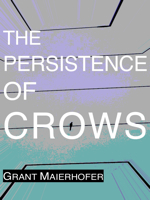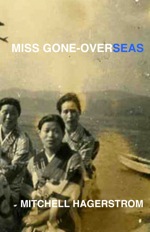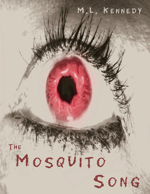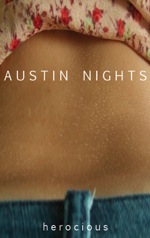
Mr. Jenkins greeted Roger outside the gymnasium of Our Mother Preparatory High School for Boys. The first words out of the man’s mouth were, “Well hello, Roger. Long time, no see, aye?” Roger was pleased that he was remembered. He introduced his wife, Diane, to the aged man, who shook her hand with the same vehement enthusiasm as he did with Roger so many years ago.
Roger was happy to see him.
From there, the couple was led into the basketball court. Overfilled green and blue balloons, representing the school colors, clung to the rafters overhead. Roger wondered why the reunion organizers would go through all the trouble of inflating the balloons without fastening them to one of the many decorated tables lining the court. He also wondered why the DJ, a stringy individual with horn-rimmed glasses, played so many Smashing Pumpkins songs when this was a reunion for the class of ’85.
These observations were disrupted when, like a paperclip to the eardrum, the words “Diane Kruger, is that really you?” punctured Roger’s thoughts. He turned to face an old and somewhat-unwanted acquaintance, William O’Hara. Bill, as he was called in school, looked exactly the same: round face, black hair, tall composure.
Diane beamed. “My God. Bill O’Hara,” she said with a laugh.
“You look great,” said Bill. He looked over to Roger. “Hey, Roger!” he said with a dumb smile.
“Hi, Bill. Long time, no see,” replied Roger, forcing a dry laugh out of his throat. Almost immediately, he was just as annoyed with the man as he was twenty years ago.
Before the conversation could progress any further, Bill was intercepted by a former basketball teammate, Henry Brooks (whose sweaty, red face indicated he had continued to play basketball until minutes before the reunion). Relieved, Roger took his wife to their designated table. He wanted to go home.
He looked down at his protruding beer belly and sighed, noticing how its inflation and deflation matched his stunted breathing. He imagined the alcohol-induced mass as a balloon gently lifting him up to the rafters to join its sober brethren. He then looked over at his wife and smiled. Diane was just as beautiful as she was the first day they met in a bookstore during their junior year. He had been attracted to her for months but had never worked up the nerve to approach her. In an attempt to initiate a conversation, he had told her that he was a fan of Jane Austen’s Persuasion; years before then, his uncle, an English professor, had told him that girls love guys who read Jane Austen. The tactic was a success, and, so many years later, Roger was still too afraid to imagine the repercussions of telling her he had never read the book (or anything by Austen, for that matter).
Other memories rushed back: their first date, a drive-thru movie; the first time they made love, in her basement. Afterward, the two curled together on her couch, she told Roger she was falling in love with him. He said he felt the same way. He remembered how beautiful she looked that night.
Diane was much older at the reunion, but she was still quite beautiful. Her blue and white sundress outshone his cheap suit, as did her luscious, curly brown hair to his increasingly-bare scalp. Roger never envisioned himself as the guy who married his high school sweetheart, but he was lucky to have her in his life. Sometimes that fact scared him.
This sense of unease was still lingering in Roger’s thoughts when Bill invited Diane to meet his wife and children at their table. Suddenly alone at his table, Roger felt like he was back at freshman homecoming. It was during this moment of bitter nostalgia that he felt a light tap on his shoulder.
“You look bored,” someone said with a cackle.
Roger turned to find Mr. Jenkins looming behind him with a knowing smile on his face.
“Is it that obvious?” asked Roger.
“Yes,” replied Mr. Jenkins. He took a seat next to Roger and produced a handkerchief from the side pocket of his tweed jacket. He then removed a pair of thick, black glasses from his angular face and proceeded to wipe them with the handkerchief as he said, matter-of-factly, “Or, maybe I can tell because I’m just as bored myself. I don’t know if you’re aware, but there’s an open bar. Would you like to get a drink?”
“I don’t know,” said Roger, not really in the mood to humor the old man.
“Come on,” said Mr. Jenkins, somewhat aggressively. He returned the glasses back to the bridge of his reddened nose and haphazardly shoved the handkerchief back into his pocket as he rose from his seat. “You’ll get to satisfy every teenage boy’s fantasy: drinking with his teacher.”
* * *
As one drink turned into a second and a third, Roger paid more attention to Mr. Jenkins’ appearance. The man generally looked the same as he did two decades earlier. His face, save for the expected wrinkles and other marks of age, was strikingly similar to the one that would greet Roger every day after B Period. It was somewhat cartoonish and, with its straight-edged nose and angular cheeks, looked like it was carefully carved out of stone. His hair was also the same: short, hazel-brown, meticulously combed to the left side of his head.
Roger took all of these things into account as he and Mr. Jenkins talked and drank. Roger told the man about his wife and daughter, his job teaching seventh-grade history at the local middle school, and other tidbits of information he thought would be mildly interesting to share. Mr. Jenkins returned the favor, telling Roger about his grandchildren and impending retirement. The men methodically exchanged small talk like two shamans exchanging ancient religious rites.
Roger and Mr. Jenkins were both considerably drunk when the conversation turned to philosophy.
“I truly did love your philosophy class, though,” explained Roger. “For a long time after that, I wanted to teach history and philosophy. You truly were a major influence on me. You’re the reason I became a teacher, Mr. Jenkins.”
“Enough with the compliments,” laughed Mr. Jenkins. “And don’t call me ‘Mr. Jenkins,’ for Chrissake. Call me Russell. No, call me Russ. We’re peers now.”
“Okay, Russ,” Roger repeated. It felt strange to call the man by his first name; the concept was as alien to him as it was to call his doctor Chuck or his mother Hannah. Roger realized that he felt like a teenager all over again when speaking with Mr. Jenkins: intimidated, curious, eager for validation. But here he was, drinking cheap wine with his former role model. The entire situation was surreal.
Mr. Jenkins lifted his glass off the bar table and rocked it back and forth, swirling the wine as if he was drinking of the finest crushed grapes of Napa Valley, rather than from a box from behind the counter. He took a sip and set the glass back within the watery ring it had left on the laminated, wooden table.
Roger looked up from his own, empty glass and said, “Say, Mr. Jenkins—er, Russ.” He laughed. “Say, Russ. I don’t know if you’d remember this, but I sure do. I remember back from class, you taught us all about the most important philosophers: Socrates, Plato, Aristotle, Descartes. You know, the whole Parable of the Tunnel, or whatever. But I remember one day you told us that you had come up with your own philosophical system.”
“Did I?” asked Mr. Jenkins.
“Oh, yes,” replied Roger, earnestly. “And I still remember the name you gave it. I do. You called it your ‘Theory of Balance.’ I also remember that for one reason or another, you never explained your theory to the class, even though we all wanted to hear about it. Or at least I did. Come to think of it, I was probably the only one who cared. But since we’re peers now, I was wondering if you’d disclose your theory to me.”
Mr. Jenkins folded his hands and peered behind both shoulders as he leaned in closer to the bar. Despite his three glasses of boxed wine, Roger still grasped the ridiculousness of the situation.
“Okay,” said Mr. Jenkins. “Where to begin?” He paused for a moment, deep in thought. “Well, as the name suggests, the Theory of Balance is grounded in the idea that everything in the universe, everything in existence, balances out in one way or another. For example – and remember, this is just a hypothetical situation – when you die, somewhere else in the world another life is beginning. I mean, there are so many people in the world. Statistically, it is quite likely that within seconds of your death, perhaps even at the precise moment of your death, a baby is born. Now isn’t that a comforting thought? I mean, if you really think about it?”
As Roger nodded his head in agreement, a major headache began to brew within him. He set his glass down, focusing his attention on the old man.
“And I think this extends into all aspects of existence, beyond simple matters like life and death,” Mr. Jenkins elaborated.
“Simple?” Roger repeated.
“Yes. Everything that happens to you, good or bad, is balanced out by what happens to other people. Other people you probably do not even know. For instance, let’s say you miss a bus you need to catch. As a result, you’re late for a very important business meeting and you lose your job. Now, if you believe in my Theory of Balance, you would find comfort in this situation.”
“Comfort?” laughed Roger.
“Yes. Because you would know that somewhere else in the world someone in the exact same situation as you caught that bus, made it to the meeting on time, and, instead of getting fired, got promoted. Something cannot exist or happen in this world without its opposite also existing . . . or . . . uhm . . . happening. So remember, when the day comes that you’re the one who misses the bus, that one day you will be in the other guy’s shoes. Nobody neither catches the bus all the time nor misses it all the time. And that, that further proves that everything balances out. After all, life would be meaningless if everybody missed the bus all the time. But it would also be boring if you caught it all the time.”
Roger looked over his shoulder at the dwindling crowd and suddenly realized how late it had become. He saw that Diane was still at Bill’s table; she was laughing at something he had said. The rest of Bill’s family was nowhere to be found. Roger turned to face Mr. Jenkins, who was patiently waiting, empty wine glass in hand.
Mr. Jenkins took a deep breath, exhausted, and leaned back in his chair. “That, in a nutshell, is my Theory of Balance.”
“Oh,” said Roger.
Roger and Mr. Jenkins talked a bit more, this time about the high school’s upcoming window renovations, before exchanging goodbyes.
“Don’t be a stranger,” remarked Mr. Jenkins.
Roger mumbled something resembling, “You too,” and stumbled around the emptying gymnasium, looking for his wife.
* * *
Diane helped him into the passenger’s seat. Roger leaned his head against the side window and watched his breath fog the glass as she got in the car and started up the engine. She did not have to adjust the seat for her legs to reach the pedals. He had forgotten to readjust them for himself when they left earlier that evening.
“Why aren’t we moving?” Roger asked, rubbing his damp forehead.
“We should wait a minute for the engine to warm up,” explained Diane.
There was a moment of silence before Roger asked, “Did you have fun?” He was still facing the window.
“Yeah, it was nice to see everybody again,” she replied.
“Everybody,” repeated Roger, with a chuckle. He turned to face her. “It seems like you only saw one person, really.”
“Roger, must we start this now? It’s late, and you’re drunk.” She was staring out the windshield with her hands on the steering wheel, as if she was driving.
He said nothing.
Diane turned to Roger and the look in her eyes made his heart sink. “Oh, Roger,” she said. “I love you.”
He said nothing. She sighed, put the car in gear, and pulled out of the parking lot.
* * *
Roger stumbled upstairs as Diane paid Jane, the babysitter. While he slowly climbed the stairs (there seemed to be more than he had remembered), he heard his wife ask, “How was Phoebe?”
“She was just fine,” said Jane, after popping a gum bubble.
When Roger reached the top of the stairs, he nudged open his daughter’s bedroom door. A shaft of light from the hallway shot through the crack in the door; otherwise, there was darkness. Then he heard from inside the darkness: “Dad?” She was awake, as she usually was whenever he and Diane stayed out late.
Roger opened the door just enough so he could squeeze through, fumbled through the dark to Phoebe’s bed, and sat down beside her. He switched on the bedside lamp. Phoebe shielded her eyes from the light.
“Sorry,” he said, moving the light away from her eyes. He could see her shadow on the wall. The lamplight briefly flickered, bringing Phoebe’s shadow in and out of darkness, as if it was being cast by a dying fire. “What’s wrong?”
“Can’t sleep,” she said. She was wearing her Halloween costume to bed again, a pink Cinderella dress. Atop her red, curly hair sat a beret Roger had given her; he had bought it many years ago, when he studied abroad in Paris. “How was your night?”
“Fun,” he said. “I saw a lot of old friends, and talked to one of my old teachers.”
“That’s nice.” Phoebe crinkled her nose and shifted in her bed.
“What’s the matter?”
“Nothing,” she said.
“You should try to get some sleep,” Roger replied. He shut off the lamp. “I love you, Phoebe.”
“I love you too, Dad.”
Roger remained on the bed, listening to his daughter’s soft breathing. A minute passed in silence. And then, like a bodiless phantom, her voice came out of the darkness. “Are you gonna go to bed?”
“Not quite yet. Is it okay if I sit here for just a bit longer?” he replied.
“Sure. I can’t sleep anyway. It’s not fair.”
“What’s not fair? That you can’t sleep?”
“Yeah.”
Roger turned the light back on. “Well, you should take comfort in knowing that somewhere else in the world, another little girl is sleeping soundly at this very moment. Isn’t that comforting? That things sort of balance out in one way or another?”
Phoebe shifted in her bed and contorted her face, deep in thought. “That’s stupid,” she finally announced. “But thanks for trying, dad.” She turned onto her side and rested her folded hands beneath her small head. As far as she was concerned, the conversation had reached its logical conclusion.
Roger turned the lamp off for the last time and stood up from her bed. He walked to the door, opened it, and stepped into the blinding light of the narrow hallway. He squinted and walked toward his bedroom, following the sounds of Diane opening dresser drawers.








